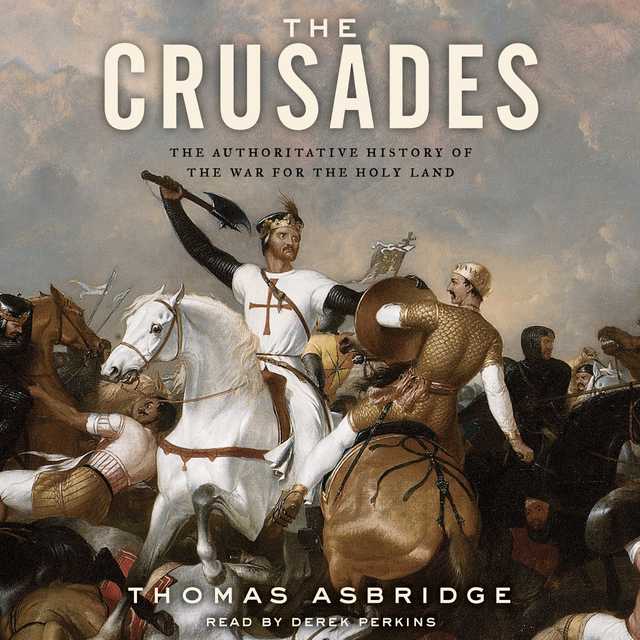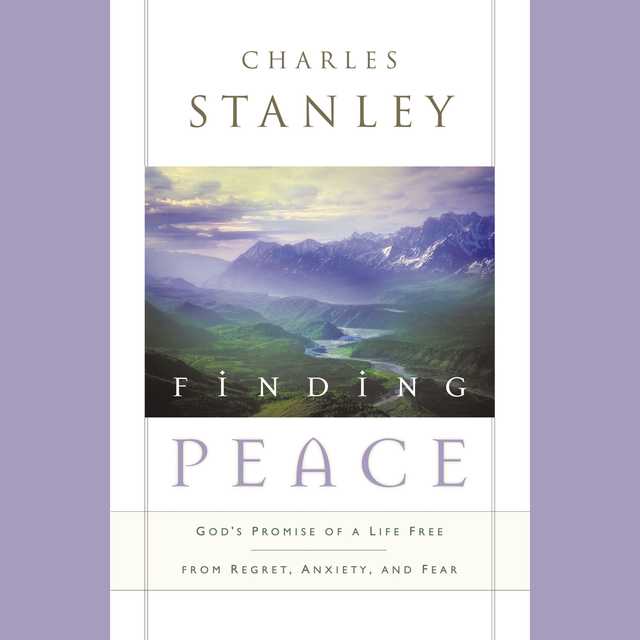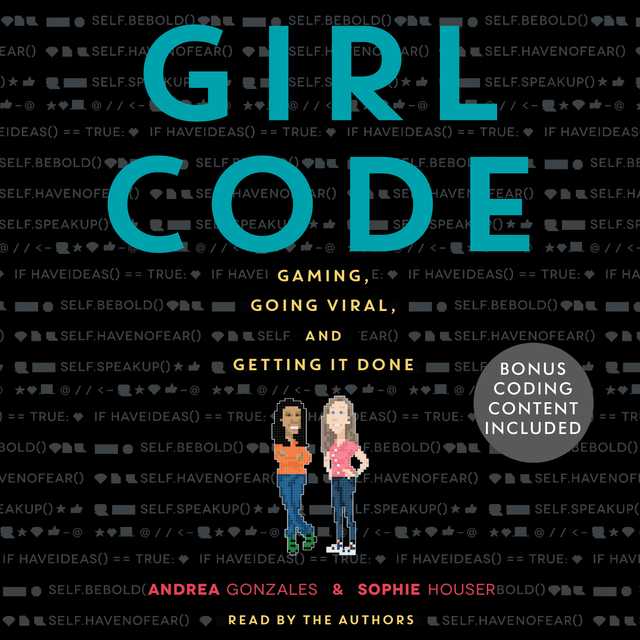The Crusades Audiobook Summary
The Crusades is an authoritative, accessible single-volume history of the brutal struggle for the Holy Land in the Middle Ages. Thomas Asbridge–a renowned historian who writes with “maximum vividness” (Joan Acocella, The New Yorker)–covers the years 1095 to 1291 in this big, ambitious, readable account of one of the most fascinating periods in history. From Richard the Lionheart to the mighty Saladin, from the emperors of Byzantium to the Knights Templar, Asbridge’s book is a magnificent epic of Holy War between the Christian and Islamic worlds, full of adventure, intrigue, and sweeping grandeur.
Other Top Audiobooks
The Crusades Audiobook Narrator
Derek Perkins is the narrator of The Crusades audiobook that was written by Thomas Asbridge
Thomas Asbridge is Reader in Medieval History at Queen Mary, University of London, and the author of 'The Greatest Knight: The Remarkable Life of William Marshal, the Power Behind Five English Thrones' (2014), 'The Crusades: The War for the Holy Land' (2010) and 'The First Crusade: A New History' (2004). He studied for a BA in Ancient and Medieval History at Cardiff University, and then gained his PhD in Medieval History at Royal Holloway, University of London.
Thomas wrote and presented a BBC documentary, 'The Greatest Knight: William Marshal', and a landmark three-part documentary series 'The Crusades' for the BBC, filmed on location across the Near East and Europe. He has also appeared in many other internationally broadcast television documentaries and radio programs, and has worked as a historical consultant for HBO and Company Pictures. He now lives in southern England.
About the Author(s) of The Crusades
Thomas Asbridge is the author of The Crusades
More From the Same
- Author : Thomas Asbridge
- The Greatest Knight
- Publisher : HarperAudio
- Abraham
- American Gods [TV Tie-In]
- Dead Ringer
- House of Sand and Fog
- Prey
The Crusades Full Details
| Narrator | Derek Perkins |
| Length | 25 hours 32 minutes |
| Author | Thomas Asbridge |
| Publisher | HarperAudio |
| Release date | August 16, 2016 |
| ISBN | 9780062561589 |
Additional info
The publisher of the The Crusades is HarperAudio. The imprint is HarperAudio. It is supplied by HarperAudio. The ISBN-13 is 9780062561589.
Global Availability
This book is only available in the United States.
Goodreads Reviews
Myke
September 05, 2018
You’d be hard pressed to find a topic more politically charged than the Crusades, especially as the world sloughs out of our War on Terror hangover, and fumbles into the terrorscape of cyber threats and subornment of the United States. People feel *really* strongly about what the Crusades should mean, and how they should be interpreted. The pressure to cleave to a political narrative when writing about this has to be incredibly strong.And it is to Asbridge’s credit that he resists it. Instead, he faithfully interprets the contemporary sources, more or less ignoring the massive tower of secondary scholarship that has both illuminated and influenced the field. Asbridge uses his extensive background in the period to interpret contemporary writers, but he also approaches the material with an empathy and a face-value commitment that’s refreshing and rare. To put it simply: Asbridge gets the medieval mind, both in the Muslim and Christian worlds, and the result is a much more even-handed look at the motivations behind the crusading phenomena. It doesn’t hurt that Asbridge has a brisk prose style that brings the narrative drama to the fore without sacrificing scholarship in the process. The crusades are, of course, a war-story, but Asbridge rightly puts the focus on the mental and emotional motivators behind the warriors, rather than straying into war-porn topics of gear, deployment and descriptions of casualties. Highly recommended.
Megan
September 01, 2016
I am fairly certain that I have read more history books than is typical for a 24-year-old girl, perhaps more than is typical for a 50-year-old man. So, I have been around the history book block a time or two. I have slowly been starting to get more and more interested in the earlier decades of the creation of nations or empires in Europe. The Crusades have always been a fairly basic given to me, Christians went to war to promote Christianity and take back Jerusalem. Cool? Reading this book, I really enjoyed the fairly unbiased look at both the Christian and Islamic camps in these struggles. It is easy to gloss over certain factors whether in favour of Christianity or Islam so equally presenting the mythic and the real, probable reasons behind actions was fantastic. It was a thorough look at the Crusades, the reasons, the preparations, the decisions, the battles and the outcomes, through the eyes of both Christian and Islamic warriors. For an overview of the entire saga of the Crusades, this was definitely a good book to read.
M(^-__-^)M_ken_M(^-__-^)M
March 04, 2022
The Crusades: The Authoritative History of the War for the Holy Land Thomas Asbridge, 1st Crusade 1095 the most stunning and effective crusade of them all, with its capture of Jerusalem 1099 and for the next 2 centuries with numerous more crusades but all of them pretty much a downward spiral of I i
Alex
July 04, 2019
The Crusades was my latest read on the titular events, which I regard as a primary focus of my historical research. It is fact- and character-driven, not a mere narrative, but a chronology describing the important events, how they came about, how we know of them, their consequences, and so on. It describes life in the era of the Crusades, how the idea of crusading evolved from an armed pilgrimage into a dedicated military enterprise, how the Crusader States were ruled, and of course, how the battles of the oriental campaigns were fought.These latter descriptions are all you can ask for in a book on military history. They are almost pedantic in how they describe who was where doing what, they describe the worst and the best in humanity, kindness shown to enemies and inhuman brutality, heroic standoffs and the suffering of the people after a prolonged siege. Asbridge not just describes strategy and tactics or military technology (although he does that spledindly), but he really gives an impression of what warfare must have felt like. Particularly memorable were the Siege of Acre, the Battle of Ramla, and the Battle of Dorylaeum, but really, you can make your pick. There is something for every fan of military history in this.As I said, the book is also character-driven. Much attention is given to such persons as Fulk Nerra of Anjou, Richard Coeur de Lion, Bohemond of Taranto, Louis IX, or Bernard Clairvaux. It is not always poignant, but that is no big problem, Asbridge relays enough of the facts that you can make up your own mind about these people. Some descriptions are better than others, but I don't think there was a character that I could not make at least some sense of towards the end. Perhaps Raymond of Toulouse comes close, but that might be on me, perhaps I am trying to read more consistency into him than I should. I cannot say I understand him less, either.The book gives a lot of attention to the muslim perspective on the Crusades and their contemporary politics. To me, that is very welcome. Asbridge manages to stay fair and largely unbiased in his assessments. He does not portray Salah Ad-din as the hero of legend, but as a shrewd politician and propagandist, a schemer, who won wars by picking his battles wisely and not by tackling the odds or heroically standing his ground. Acre was the first time he led a protracted siege, and while he eventually grew to the task, he could've stopped the siege dead by taking decisive action in the beginning. In this, he was more like the opposite of Richard Coeur de Lion, not his counterpart. King Richard was a daredevil, who fought in the first rank, perhaps one of the greatest warriors of his age. Salah Ad-din created an image of himself as the designated warrior of god years before he actually came to believe this image following a severe illness, he did not treat Christians as kindly as is commonly claimed, and yet he fought more wars against his fellow muslims than against the Christians, like someone out to amass power. Still, he was not a particularly despicable individual, unlike Zangi and Baybar, who are rightly portrayed as the bloodlusty tyrants they were. Particularly nice was that Asbridge also described the origin of the Druze, and the cooperation between muslims and Christians in the Holy Land, as when Templars allowed a muslim to pray in his old moschee turned Church, even taking away the altar for the duration of his prayer, or when muslim and Christian farmers worked the same land, or when crusaders traded with Fatimids. Overall, I was impressed at how little actual hatred there was between Christians and muslims as such, despite the brutality of the wars and battles. Apparently, the Turks and the Franks, after slaughtering each other, went home without feeling like the other side had to be annihilated. Modern man seems utterly incapable of this, sometimes, he either succumbs to sentimental pacifism, or to the worst barbarism. Of violence without hatred, he cannot make sense. The book had some weaknesses. The slaughter of the Jews along the Rhineland is attributed to Peter the Hermits troops, but The Glory of the Crusades attests it to the Count of Leiningen, and as it goes into a lot more detail on this episode, I am more inclined to follow it. Gregory VII and Urban II are both accused of dehumanizing muslims by pointing out attacks against Christian pilgrims, which I see as very unfair. The skepticism towards these attacks strikes me as biased. That there is little corroborating evidence is to be expected in such a time, it's not like anyone kept strict record of Christian pilgrims killed at the border. He overrates the elitism and isolation of the Franks, considering that many of them took foreign wifes, although he also admits that the Crusader states produced unique art that combined frankish, byzantine and even arabic influences, so it is not like he gets lost in a preconceived narrative. On the siege of Jerusalem and the resulting massacre, he seemed a bit confused, like he first wrote about the massacre and only then found the theory that the descriptions of crusaders wading through blood that ran as high as their knee, or ankle, or the bridles of their horse, are allusions to Revelation 14:20. Most importantly, perhaps, he does not do a good job on the Fourth Crusade, rushing the chapter and not describing the events that led to the sack of Constantinople, so that one does not leave with a much better understanding of the episode than the standard narrative, which was a huge disappointment to me. None of these errors struck me as expressive of any failure as a scholar or a person, however. Everyone has his oversights, his blindspots, or research that he does not quite enjoy. I highly respect Thomas Asbridge for having written this book. It is a fine history book, and overall, remarkably unbiased, fact-driven, and thorough. Certainly, it is more worthwhile than a good deal of other books on the crusades. It does not uncritically repeat narratives, it tries not to play favorites (Asbridges admiration for King Richard was hard to overlook, but he did not bluntly excuse his famous massacre of prisoners), and it doesn't make a stupid quip every other page. I know I learned a lot from it, and so I can wholeheartedly recommend it.
Jeff
January 30, 2014
Asbridge's account of the Holy Wars from 1095-1291 is a well written and engaging work. Asbridge has done what Rodney Stark, author of God's Battalions: The Case for the Crusades has done; he has written a history that reads more like a story. The highlights of this work are The First Crusade, especially Baldwin I of Jerusalem's conquests after 1099 and Saladin's history prior to The Battle of Hattin. The Second Crusade is passed over quickly (something common with most historians of this movement) and The Third Crusade is were Asbridge spends considerable time (with merit, but after reading many books, the Third Crusade and it's clash between Lionheart and Saladin is getting old;). The Fourth and Fifth Crusades read much like Christopher Tyerman's and other authors and do not illicit much emotion. However, Asbridge does accomplish what few Crusade authors have done; he helps you connect with the people. Most books on the crusades are about the campaigns themselves, motives, and politics. While Asbridge does cover these points which are intrinsic aspects of crusading, he in addition helps you get to know people like Baldwin I and Baldwin IV, Zengi and Nur ad-Din, Richard Coeur de Lionne (The Lionheart) and Saladin. I have read many books on the crusades, but only Asbridge has been able to get me to fall in love with the people. Names like Bohemond, Tancred, Baldwin, Robert, Phillip Augustus, Zengi, Nur ad-Din, Al-Kahlil, Al-Afdal, and many more were just names and conquerors; but thanks to Asbridge they are now intriguing people who deserve to be remembered for more than their prowess with a sword and tactics on the battlefield. Their ambitions are much like ours, only they were set in a Medieval world were one carved out those ambitions with a blade instead of a pen.
Joseph
January 09, 2022
Having recently completed Dan Jones’ “The Templars”, I realized how little I knew about the Crusades. Thomas Asbridge’s “The Crusades” is about as comprehensive as a single volume can get.In just under 700 pages of text, Asbridge runs through the entirety of the Crusade era, starting with the request for aid from Byzantine emperor Alexius I Comnenus and Pope Urban IIs call to arms in 1095, through the mamluk conquest of Acre in 1291. What makes this volume so interesting is that it covers both Christian and Muslim points of view. Too often, the western point of view prevails, but Asbridge gives both sides of the history equal weight.Asbridge also fills in a lot of gaps about the patch work nature of the Outremer states as well as the factionalism of the Abbasids on the frontier of their territory, allowing first the Zangids and then the Ayyubids to become the dominant powers in Syria and the Levant.Asbridge also has a very interesting concluding chapter where he covers how the crusades were thought of in the subsequent centuries, and how only in the last 100 years or so has the memory of the crusades been used for nationalistic, religious, and political gain.I highly recommend this book to anyone interested in a complete history of the crusades, even for someone with little to no prior knowledge of the era.
Jonathan
May 03, 2021
Great look at the Crusades in one volume. Very readable and easy to understand.
Sean-Paul
July 25, 2022
“… when Latin crusading armies arrived in the Near East to wage what essentially were frontier wars, they were not actually invading the heartlands of Islam. Instead, they were fighting for control of a land that, in some respects, was also a Muslim frontier…” “The once fashionable myth that crusaders were self-serving, disinherited, land-hungry younger sons must be discarded. Crusading was instead an activity that could bring spiritual and material rewards, but was in the first instance both an intimidating and extremely costly activity. Devotion inspired Europe to crusade, and in the long years to come the First Crusaders proved time and again that their most powerful weapon was a shared sense of purpose and indestructible spiritual resolution.”I’m really glad I got around to this book. The author’s prose is easy to understand, especially when it comes to the reader to visualize the narrative as it goes. One may need to pull out a map or research certain terms and characters, but that’s the fun part! Definitely recommend for anyone who may have even the slightest interest in the various Crusades and it’s campaigns, the politics from the Caliphates and Christian Europe, and the cultural/power struggle in the Levant, the Nile, and other regions.
Most Popular Audiobooks
Frequently asked questions
Listening to audiobooks not only easy, it is also very convenient. You can listen to audiobooks on almost every device. From your laptop to your smart phone or even a smart speaker like Apple HomePod or even Alexa. Here’s how you can get started listening to audiobooks.
- 1. Download your favorite audiobook app such as Speechify.
- 2. Sign up for an account.
- 3. Browse the library for the best audiobooks and select the first one for free
- 4. Download the audiobook file to your device
- 5. Open the Speechify audiobook app and select the audiobook you want to listen to.
- 6. Adjust the playback speed and other settings to your preference.
- 7. Press play and enjoy!
While you can listen to the bestsellers on almost any device, and preferences may vary, generally smart phones are offer the most convenience factor. You could be working out, grocery shopping, or even watching your dog in the dog park on a Saturday morning.
However, most audiobook apps work across multiple devices so you can pick up that riveting new Stephen King book you started at the dog park, back on your laptop when you get back home.
Speechify is one of the best apps for audiobooks. The pricing structure is the most competitive in the market and the app is easy to use. It features the best sellers and award winning authors. Listen to your favorite books or discover new ones and listen to real voice actors read to you. Getting started is easy, the first book is free.
Research showcasing the brain health benefits of reading on a regular basis is wide-ranging and undeniable. However, research comparing the benefits of reading vs listening is much more sparse. According to professor of psychology and author Dr. Kristen Willeumier, though, there is good reason to believe that the reading experience provided by audiobooks offers many of the same brain benefits as reading a physical book.
Audiobooks are recordings of books that are read aloud by a professional voice actor. The recordings are typically available for purchase and download in digital formats such as MP3, WMA, or AAC. They can also be streamed from online services like Speechify, Audible, AppleBooks, or Spotify.
You simply download the app onto your smart phone, create your account, and in Speechify, you can choose your first book, from our vast library of best-sellers and classics, to read for free.
Audiobooks, like real books can add up over time. Here’s where you can listen to audiobooks for free. Speechify let’s you read your first best seller for free. Apart from that, we have a vast selection of free audiobooks that you can enjoy. Get the same rich experience no matter if the book was free or not.
It depends. Yes, there are free audiobooks and paid audiobooks. Speechify offers a blend of both!
It varies. The easiest way depends on a few things. The app and service you use, which device, and platform. Speechify is the easiest way to listen to audiobooks. Downloading the app is quick. It is not a large app and does not eat up space on your iPhone or Android device.
Listening to audiobooks on your smart phone, with Speechify, is the easiest way to listen to audiobooks.






























